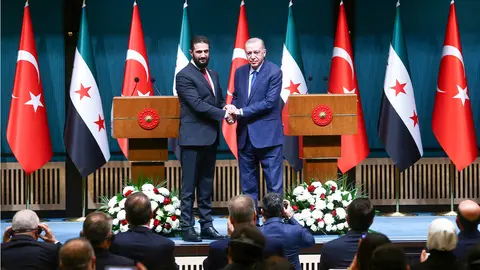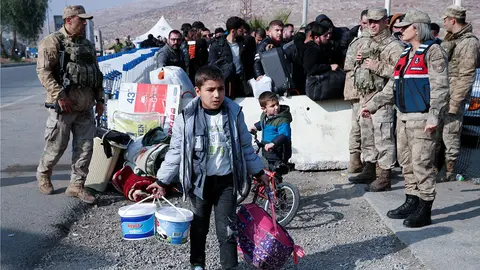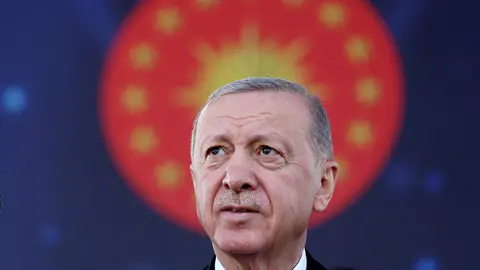Profound transformation in Turkey and the region after Ocalan's call for the PKK to lay down their arms, but doubts remain

Turkey's jailed militant leader Abdullah Ocalan on Thursday called on his Kurdistan Workers' Party (PKK) to lay down its arms, a move that could end his 40-year conflict with Ankara and have significant political and security consequences for the entire region.
“I am making a call for the laying down of arms, and I take on the historical responsibility of this call,” Ocalan said in his statement.
Ocalan wants his party to hold a congress and to formally agree to dissolve itself, he was quoted as saying.
In the first reaction to Ocalan’s appeal from President Erdogan’s ruling AK Party, its deputy chairman Efkan Ala said Turkey would be “free of its shackles” if the PKK truly laid down its weapons and disbanded.
There was no immediate response from the PKK commanders’ headquarters in the mountains of northern Iraq.
But in an interview published last week, Duran Kalkan, a senior member of the PKK, suggested that many issues remained unresolved.
“No one should think that there will be an easy negotiation at the table, signatures will be made and everything will be solved,” he said. “The other side wants to eliminate the PKK”.
The PKK has launched its armed campaign in 1984 for an ethnic Kurdish homeland in southeastern Turkey. It has since moved away from its separatist goals and instead sought more autonomy for southeast Turkey and greater Kurdish rights.
Ending the insurgency would be a major achievement for Turkey’s president after past efforts failed to resolve a conflict in which more than 40,000 people have died since 1984. Erdogan has called it “one of the last obstacles blocking the goal of a great and powerful Turkey.”
Ocalan’s call may also boost Erdogan’s own political prospects.
In order to extend his rule beyond 2028, when his last term as president ends, the Turkish president would need the support of an opposition party, perhaps DEM, in order to amend the constitution or bring about early elections.
He could also capitalise on military gains against the PKK in mountainous northern Iraq, where it is based, and in Syria, where the ouster of Bashar Al-Assad in December has led to the establishment of a strongly pro-Turkey leadership in Damascus.
Gönül Töl, an analyst at the Middle East Institute in Washington, said Öcalan likely decided the time was right to call for an end to hostilities as “he thinks things are not going well for the PKK right now.”
Berkay Mandıracı, of the International Crisis Group, said the PKK appeared to be “weakened” after a decade of fighting.
With Ankara poised to play a major role in Syria and the wider region, he said, Turkish officials wanted to remove any potential impediments.
But there are risks for Erdogan in resurrecting Ocalan, a figure reviled by most Turks.
If PKK fighters refuse to heed Ocalan’s call and violence continues or even worsens, the distrust that many Turkish Kurds already have for Erdogan could deepen.
Some of Erdogan allies responded to Öcalan’s announcement with caution. “We will look at the result,” said the deputy head of Erdoğan’s ruling Justice and Development party.
The pro-Kurdish political movement, the target of a years-long judicial crackdown, will hope Ocalan’s call eventually translates into democratic reforms and greater cultural and language rights for Kurds.
“This is the breaking point of history and it is a positive one,” said Sırrı Süreyya Önder of the DEM party. “We are here with a compass to find a possible route out of these dark chaotic days.”
A peace deal could also ease social tensions generally across Turkey, and boost the under-developed economy of its mainly Kurdish southeast.
The call by Ocalan is expected to reverberate outside Turkey’s borders.
The leader of the Kurdish-led Syrian Democratic Forces said Thursday that Ocalan’s call for will not affect the SDF.
“The PKK’s call to lay down their arms concerns them and does not concern our forces in Rojava (northeastern Syria),” said Mazloum Abdi, head of the SDF, whose main component, the People’s Protection Units (YPG), Ankara considers an offshoot of the Kurdistan Workers’ Party (PKK).
But analysts say that if Abdi can filter YPG members from his group, the Kurdish forces could more easily join Syria’s newly-forming security structure, stabilising the country as it emerges from 13 years of civil war.
Iraq’s Kurdistan regional president Nechirvan Barzani welcomed Ocalan’s call.
“We warmly welcome Ocalan’s message… and we call on the PKK to adhere to and implement this message,” Barzani said on X.
Only the future will tell if Ocalan’s call will end, once and for all, the long bloody confrontation between the PKK and the Turkish state.
Peace could a the Kurds consolation prize after a struggle to emerge from their status as the world’s largest stateless people since the collapse of the Ottoman Empire after World War I, say analysts.











